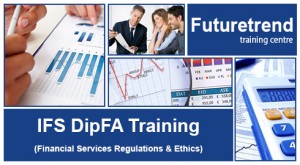A Summary of the IFS and CII Financial Advisor Diploma Courses
This blog summarises the basic elements of both the IFS and CII 
Diploma courses. It should be noted that neither is “better” or more “difficult” than the other, it is simply a question of which qualification route is more suitable for you. Whilst I cannot offer individual career advice, hopefully the information in this blog will help you if you are trying to decide which option to choose.
What does the Diploma qualify you to do?
The qualification means that you can advise on regulated collective pensions and investment products, including all types of funds; as well as insurance products. The qualification does not cover mortgage advice which requires a separate qualification. The qualification does not cover Discretionary Investment Management or advice on Direct Securities (Stocks and Shares), both of which require additional or different qualifications
Candidates should make their own decisions based upon their own requirements and career plans. Full details are on the relevant professional bodies’ websites. The information in this blog is based on the relevant websites.
CII
http://www.cii.co.uk/qualifications/diploma-in-regulated-financial-planning-qualification/
IFS
http://institute.ifslearning.ac.uk/Qualifications/QualificationsinFinancialAdvice/DipFA.aspx
What is the Diploma and what does it involve?
Both the IFS and CII Diplomas are recognised as compliant qualifications for Investment Advisers, that is those wishing to advise on pensions and investments, which technically means holding the FCA Approved Person status CF30. Both the IFS and CII options are recognised by the FCA as appropriate qualifications, and are at an academic level called QCF Level 4 which has been confirmed as such by OfQual (the exams regulator).
It is worth remembering that the syllabus is issued by the FCA, and each Diploma therefore meets that syllabus. However, despite the fact they share the same syllabus, they are tested very differently;
- The CII route has a greater emphasis on ‘technical’ knowledge and there is more maths. There are five multiple choice exams and one written exam, with each technical area of the syllabus being tested separately then all the areas being brought together for the last written exam. For candidates that are looking to focus on investments, are comfortable with multiple choice assessments, prefer a more technical approach, or who don’t really fancy writing essays (see IFS below), this is probably a solid route to consider.
- The IFS route has a greater emphasis on a more holistic or generalist approach, and is less ‘technical’ with less emphasis on maths. However, it only has one multiple choice exam (regulations and ethics), and instead has two demanding essay based assessments, which have to be written at an academic standard equivalent to the first year at University. In both written assessments, technical knowledge is tested as part of an overall written assignment. For candidates that are looking at more general financial planning, are less ‘technical’, or who prefer the essay option, this is probably a solid route.
I tutor and train candidates for each route, so I know that each route is a demanding and difficult route to take! However, on an individual basis, candidates may feel that a particular route is more suitable for themselves. Some-one who is very uncomfortable doing essays may be better off with the CII route, whereas some-one who is uncomfortable with more technical questions may be better off with the IFS route.
Even though the two Diplomas are equal in the eyes of the FCA’s requirements that does not mean that the IFS and CII necessarily see each other’s qualification as equal! A recent article described the cost incurred by a Diploma qualified adviser who switched from being an IFS member to a CII member (1). Some-body switching from one diploma route to another would need to apply for credits based on their existing exams, which is assessed on an individual basis each time. Therefore, before commencing a Diploma, students should seriously consider which body they wish to study with based upon their own requirements and future career plans.
Timescales may also be important to you. All of the CII Multiple Choice exams, and the one IFS Multiple Choice exam, can be accessed all year round at your own convenience. However, the final CII paper, R06, is quarterly. The last two written assessments from the IFS (called Advanced Financial Advice or AFA) are also quarterly and are taken one after the other.
Comparison Table – see notes below
| |
Cost |
Modules/Units |
Study Time(hours) |
Summary of Assessment |
Pass Mark |
| IFS |
£684 |
3 |
400 |
· One Multiple Choice exam (FSRE)· One Coursework (4,000 word essay and short questions)
· One Written Exam (Suitability Report 3 hour written exam)
· Together known as AFA |
· 70% for the Multiple Choice Exam· 50% for the two written assessments |
| CII |
£1,059 |
6 |
370 |
· Five Multiple Choice Exams (R0 1 to 5)
· One Written Exam (Fact Find 3 hour exam short answers) (R06) |
· 65% to 70% for the Multiple Choice exams· 55% for the Fact Find exam |
Notes –
- IFS – The costs of the IFS option can be reduced to £575 if you decide not to take up the IFS online tutor option. However, if you decide to ‘de-link’ the IFS FSRE and AFA to take the qualification in less or more than the 9 months’ timetable, the costs may increase. The IFS costs include the Study Texts automatically.
- CII – The CII Option is more expensive if you are not a CII member – frankly it just wouldn’t make sense not to join the CII! The CII option does not automatically include the Study Texts, so I have included them above. However, if the Study Texts are not bought, the cost can be reduced significantly. The above option is called the Diploma in Regulated Planning.
- Re-sits will cost more in all cases.
Another option for existing CII exam holders
There is another CII Option, called the Diploma in Financial Planning. This is useful for those who already hold other CII credits at Diploma level. On a personal basis you can pick and choose from a wide range of R0 and J0 diploma level papers, and then provide Structured Gap Fill to ensure you meet the syllabus of the post RDR Level 4 FCA requirements. However, be aware that the Gap Fill is genuine Structured Gap Fill!
Other Qualifications
There are a wide range of approved qualifications, so this blog focuses on the ones that I train on. The IFS and CII Diploma routes are the main routes for financial advisers, however there are others. For those looking at stock-broking, the CISI also offers courses for investment advisers working solely in investment advice for stockbrokers, wealth managers, etc. For such students and also those aiming for fund management or international investment based careers, there is also the CFA route.
Make Your Choice!
Whichever route you choose is ultimately up to you, as each Diploma achieves the regulatory requirements, albeit in different ways. Some firms have a clear internal policy preference for a particular route so in those cases the choice may be made for you!
I hope this explanation and comparison of the two main Diploma options has helped you.
Paul Davis,
BA (Hons), Cert.Mgmt (Open), Dip. PFS
References
Notes –
All reference to external websites and bodies is taken at the readers own risk, as Lewis Davis Ltd accept no responsibility for the accuracy of any external website or organisation. Errors and Omissions excepted.
The terms IFS, CII, CISI and CFA are registered trademarks and the use of these terms by Lewis Davis Ltd does not imply any association or accreditation by those bodies of Lewis
Paul provides DipFA FSRE Training, Advanced Financial Advice Training and various CII modules Training for Futuretrend

 Futuretrend would like to wish all our students and followers the very best this festive season.
Futuretrend would like to wish all our students and followers the very best this festive season.
.jpg)






